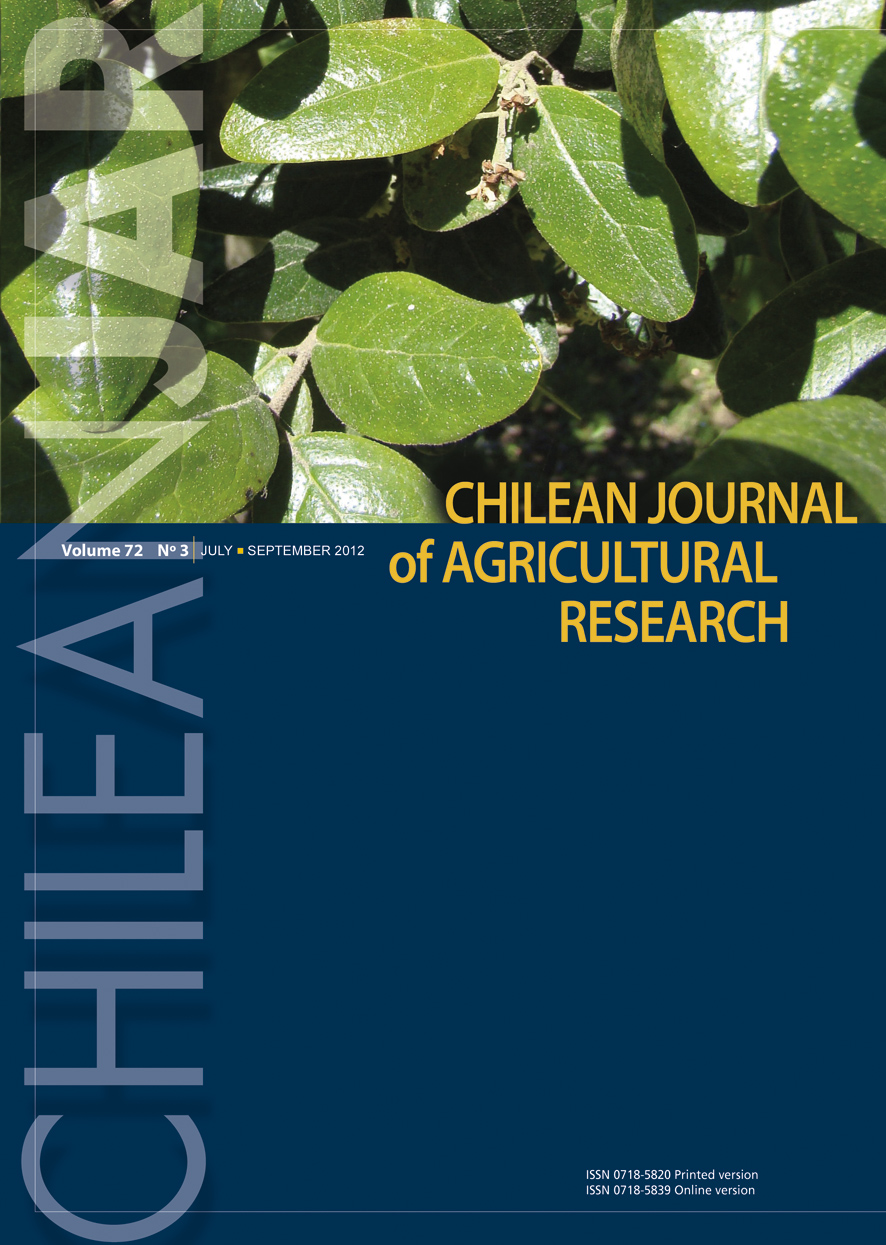
|
Chilean Journal of Agricultural Research
Instituto de Investigaciones Agropecuarias, INIA
ISSN: 0718-5820
EISSN: 0718-5820
Vol. 69, No. 1, 2009, pp. 88-96
|
 Bioline Code: cj09010
Bioline Code: cj09010
Full paper language: Spanish
Document type: Research Article
Document available free of charge
|
|
|
Chilean Journal of Agricultural Research, Vol. 69, No. 1, 2009, pp. 88-96
| en |
Effect of Arbuscular Mycorrhizal Fungi on an Ecological Crop of Chili Peppers ( Capsicum annuum  L.) L.)
Castillo R., Claudia; Sotomayor S., Leonardo; Ortiz O., César; Leonelli C., Gina; Borie B., Fernando & Rubio H., Rosa
Abstract
Mapuche farmers in southern Chile have been cultivating local ecotypes of chilipepper (Capsicum annuum L.), called locally “Cacho de cabra” for many decades. It is used to make “merkén”, a condiment that is consumed locally and exported. This vegetable requires a nursery stage and can obtain nutritional benefits from symbiotic associations such as mycorrhizal fungi, achieving a better adaptation to transplanting. Arbuscular mycorrhizal fungi (AMF) are obligate biotrophes appearing in abundance in agroecosystems with conservation management. The aim of this study was to compare effectiveness of two AMF, a commercial mycorrhizal inoculant (IC, Glomus intraradices) and another native (IN, Glomus claroideum) with a control without inoculation (-I) on the production and quality of “Cacho de cabra”. At 45 days after sowing (DAS) transplanting was carried out and at 90 and 216 DAS fruit quality, fungal and edaphic parameters were evaluated. The harvest was at four stages. With IN inoculation plants and with greater foliar area were obtained. Also, precocity of fruit production was observed. The harvest started 49 days earlier and fresh weight was 177% higher than that of the control. Root colonization was low, showing significant differences between IN and IC, while a large number of spores was produced in the substrate. It was concluded that inoculation with native fungi decreased transplanting stress thus accelerating the maturation stage of plants and resulting in higher and better yield quality.
Keywords
mycorrhiza, inoculant, biofertilizers, fruit quality, vegetables
|
| |
| es |
Efecto de los hongos micorrícicos arbusculares en un cultivo ecológico de ají ( Capsicum annuum  L.) cacho de cabra. L.) cacho de cabra.
Castillo R., Claudia; Sotomayor S., Leonardo; Ortiz O., César; Leonelli C., Gina; Borie B., Fernando & Rubio H., Rosa
Resumen
En el sur de Chile, agricultores mapuches han cultivado durante décadas ecotipos locales de ají (Capsicum annuum L.)“Cacho de cabra” para elaborar “merkén”, producto con reconocidas ventajas en el mercado internacional. Esta hortaliza requiere etapa de almácigo, pudiendo beneficiarse nutricionalmente con la asociación simbiótica del tipo micorrizas,logrando una mejor adaptación al trasplante. Los hongos micorrícicos arbusculares son biótrofos obligados abundantes en agrosistemas con manejo conservacionista. El objetivo de este estudio fue comparar, en invernadero, el efecto de la inoculación de dos hongos, uno comercial, Glomus intraradices (IC),y otro nativo, Glomus claroideum (IN), con un testigo sin inoculación (-I) sobre la producción y calidad de ají “Cacho de cabra”. A los 45 días después de la siembra (DDS) se realizó el trasplante y a los 90 y 216 DAS se evaluaron parámetros de calidad del fruto, fúngicos y edáficos. La cosecha fue escalonada en cuatro etapas. Con la inoculación de IN se obtuvieron plantas de mayor altura y área foliar que mostraron mayor velocidad de desarrollo del fruto adelantándose la cosecha en 49 días y con aumentos en el peso fresco de 177% en relación al control. La colonización en las raíces de ají fue baja con diferencias significativas entre IN e IC, mientras que una gran cantidad de esporas permaneció en el sustrato. Se concluye que la inoculación con hongos nativos disminuyó el estrés del trasplante acelerando la maduración del ají con aumento de producción y calidad.
Palabras-clave
micorriza, inoculante, biofertilizantes, calidad fruto, hortalizas.
|
| |
© Copyright 2009 - Universidade de Santa Cruz do Sul
Alternative site location: http://www.inia.cl
|
|
